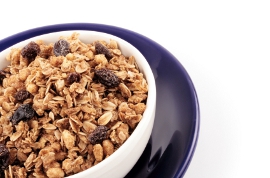Hold the Wonder Bread
More evidence that eating whole grains leads to better health

The association between whole-grain consumption and volume of fat was found even after scientists accounted for other lifestyle factors. Photo: iStock
People who consume several servings of whole grains per day—and limit their daily intake of refined grains—appear to have less of a type of fat tissue thought to play a key role in triggering cardiovascular disease and type 2 diabetes, according to a new study.
Tufts researchers found that people who eat mostly whole grains instead of refined grains had lower volumes of a particular fat called visceral adipose tissue, or VAT, which surrounds the internal organs. Those who ate whole grains and many refined grains did not show the positive effect.
The volume of VAT was about 10 percent lower in adults who reported eating three or more daily servings of whole grains and who limited their intake of refined grains to less than one serving per day.
“For example, a slice of 100 percent whole wheat bread or a half cup of oatmeal constituted one serving of whole grains, and a slice of white bread or a half cup of white rice represented a serving of refined grains,” says the study’s lead author, Nicola McKeown, an assistant professor at the Friedman School and director of its nutritional epidemiology program. The research was published in the American Journal of Clinical Nutrition.
The researchers examined diet questionnaires submitted by 2,834 men and women enrolled in the Framingham Heart Study’s offspring and third-generation study group. The participants, ages 32 to 83, underwent scans to determine their volume of VAT and other fats.
“Prior research suggests visceral fat is more closely tied to metabolic syndrome—a cluster of risk factors including hypertension, unhealthy cholesterol levels and insulin resistance—that can develop into cardiovascular disease or type 2 diabetes,” explains co-author Paul Jacques, director of the Nutritional Epidemiology Program at the Jean Mayer USDA Human Nutrition Research Center on Aging at Tufts.
The association between whole-grain consumption and VAT was found even after scientists accounted for “other lifestyle factors, such as smoking, alcohol intake, fruit and vegetable intake, percentage of calories from fat and physical activity,” says Jacques, who is also a professor at the Friedman School.
The study builds on prior research that associated greater whole-grain intake with reduced risk of metabolic syndrome and insulin resistance. “However, because these studies are observational, future research that specifically investigates whole-grain intake and body fat distribution in a larger, more diverse study population is needed to identify the mechanism that is driving this relationship,” Jacques adds.
Refined grains apparently need to be kept to a minimum for the positive effects to take hold. “Whole-grain consumption did not appear to improve VAT volume if refined grain intake exceeded four or more servings per day,” says McKeown. “This result implies that it is important to make substitutions in the diet, rather than simply adding whole-grain foods. For example, choose to cook with brown rice instead of white, or make a sandwich with whole grain bread instead of white bread.”
